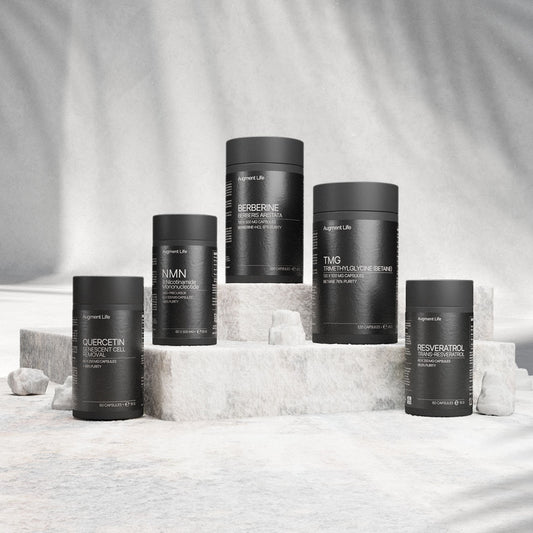Alzheimer’s is a highly disabling disorder that affects millions of people worldwide. It is a progressive neurodegenerative disease that leads to the loss of synapses, nerve cells, and tissue throughout the brain. Over time, the brain size shrinks and affects almost all its functions.
As it is an emerging global health problem, many studies seek potential targets to modify its trajectory and prevent its advances. But is there anything new?
This article explores how resveratrol – a potent antioxidant with anti-aging properties – alters the biomarker trajectories of Alzheimer’s Disease.
Key Takeaways:
- Resveratrol consumption is safe, well-tolerated, and may slow cognitive and functional decline in Alzheimer’s.
- Resveratrol alters biomarker trajectories of Alzheimer’s Disease by preventing a progressive decline of amyloid-β as dementia advances.
- Resveratrol regulates neuro-inflammation, induces adaptive immune responses, and helps to preserve the integrity of the blood-brain barrier in Alzheimer’s Disease.
- To know the twelve modifiable risk factors for Alzheimer’s and other dementia.
Alzheimer’s Disease
Alzheimer’s disease is the most common form of dementia. Increasing age is the leading risk factor, even in individuals with high genetic risk1. In 2019, the number of individuals estimated with Alzheimer’s and other dementia was about 57.4 million globally. Since population aging and growth drive this increase, this number is estimated to reach around 152.8 million cases in 20502.
Alzheimer's disease affects brain parts that control thought, memory, and language. Clinical symptoms begin with mild memory loss and advance into comprehensive dementia – memory, cognitive and executive dysfunction – and behavior changes affecting a person's ability to carry out daily activities3.
Individuals with symptoms of Alzheimer’s disease may experience one or more of the following3:
- Getting lost in a known place, repeating questions.
- Difficulty in handling money and paying bills.
- Problem completing routine tasks at home, at work, or at leisure.
- Poor judgment.
- Misplacing things and needing help to retrace steps to find them.
- Changes in mood, personality, or behavior.
Alzheimer’s is characterized by abnormal deposits of amyloid-β protein fragments between nerve cells and neurofibrillary tangles (formed by twisted Tau protein filaments) in the brain. These alterations lead to the loss of brain signalization (synapses and neurons)1.
As dementia advances, the protein Amyloid-β (Aβ40 and Aβ42) reduces in cerebrospinal fluid (the fluid surrounding the brain and spinal cord) and plasma. Amyloid-β levels (Aβ42) lower than 600 ng/ml in cerebrospinal fluid is a biomarker to confirm Alzheimer’s disease4.
Risk Factors for Alzheimer’s and Other Dementia
Scientific evidence suggests that healthy behaviors reduce the risk of Alzheimer’s Disease, other dementia, cancer, diabetes, and heart disease.
The Lancet Commission on dementia prevention, intervention, and care suggest that up to 40% of dementia (all types of dementia) prevalence might be preventable through interventions targeting modifiable risk factors5. The main risk factors are:
- Less education
- Hypertension
- Hearing impairment
- Smoking
- Obesity
- Depression
- Physical inactivity
- Diabetes
- Low social contact
- Excessive alcohol consumption
- Traumatic brain injury
- Air pollution
Thus, changes in the exposure to risk factors – for example, decreasing harmful risk factors and increasing protective factors – can reduce the disease prevalence in the future5.
Given that no disease-modifying therapies exist, multimodal interventions arise as a promising approach to postponing or preventing diseases of aging.
How resveratrol affects the trajectory of Alzheimer’s Disease?
In preclinical studies, resveratrol – a potent antioxidant with anti-aging properties – decreases behavioral deficits and central nervous system amyloid-β deposition. Some studies have investigated their effects on biomarker trajectories of Alzheimer’s disease3,4.
A randomized, placebo-controlled, double-blind clinical trial tested the effects of resveratrol (from 500mg up to 1 g daily) in 119 individuals with mild to moderate Alzheimer’s Disease. Compared to placebo, resveratrol stabilized amyloid-β levels in the cerebrospinal fluid (Aβ40 and Aβ42) and plasma (Aβ40) of subjects with mild-moderate Alzheimer’s – preventing a progressive decline of amyloid-β as dementia advances. After 52 weeks, resveratrol consumption was safe and well-tolerated even at high doses4.
In a retrospective study, resveratrol attenuated the cognitive and functional decline in individuals with Alzheimer’s Disease during the 12-month study. Resveratrol showed an anti-inflammatory effect reducing the level of metalloproteinases that regulates blood-brain barrier permeability. By diminishing metalloproteinases, resveratrol reduces brain permeability and limits the infiltration of inflammatory agents into the brain3.
Despite the limitations in detecting clinical benefits, these results suggest that:
- Resveratrol consumption may slow progressive cognitive and functional decline in subjects with mild to moderate Alzheimer’s Disease.
- Resveratrol can modulate anti-inflammatory responses and maintain the integrity of the blood-brain barrier in Alzheimer’s Disease.
- Resveratrol consumptions alter the biomarker trajectories of Alzheimer’s Disease by stabilizing the progressive decline levels of amyloid-β.
These results encourage new research to investigate the potential of resveratrol consumption to postpone or prevent Alzheimer’s Disease.
- Congdon, E.E., Sigurdsson, E.M. Tau-targeting therapies for Alzheimer disease. Nat Rev Neurol 14(7), 399-415 (2018). https://doi.org/10.1038/s41582-018-0013-z
- GBD 2019 Dementia Forecasting Collaborators. Estimation of the global prevalence of dementia in 2019 and forecasted prevalence in 2050: an analysis for the Global Burden of Disease Study 2019. Lancet Public Health 7(2), e105-e125 (2022). https://doi.org/10.1016/S2468-2667(21)00249-8
- Center for Disease Control and Prevention. Alzheimer’s Disease and Related Dementias. Accessed in April 2023: https://www.cdc.gov/aging/aginginfo/alzheimers.htm
- Moussa, C., Hebron, M., Huang, X., Ahn, J., Rissman, R.A. et al. Resveratrol regulates neuro-inflammation and induces adaptive immunity in Alzheimer’s disease. Journal of Neuroinflammation 14:1, (2017). https://doi.org/10.1186/s12974-016-0779-0
- Livingston, G., Huntley, J., Sommerlad, A., Ames, D., Ballard, C. et al. Dementia prevention, intervention, and care: 2020 report of the Lancet Commission. Lancet 396(10248), 413-446 (2020). https://doi.org/10.1016/S0140-6736(20)30367-6
- Turner, R.S., Thomas, R.G., Craft, S., van Dyck, C.H., Mintzer, J. et al. A randomized, double-blind, placebo-controlled trial of resveratrol for Alzheimer disease. Neurology 85(16), 1383-1391 (2015). https://doi.org/10.1212/WNL.0000000000002035









